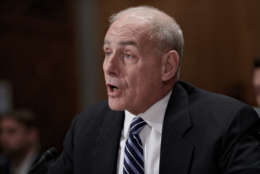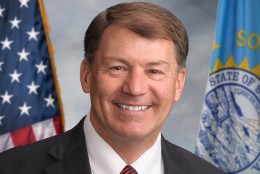Senate
-
In today's Top Federal Headlines, Secretary of Homeland Security John Kelly wants to improve personnel systems for DHS workers to build on improving morale.
April 06, 2017 -
Sen. Mike Rounds (R-S.D.), chairman of the Armed Services Subcommittee on Cybersecurity, introduced the DoD Cyber Scholarship Program Act, which would help increase the number of people in the armed services trained in cybersecurity. Rounds fills in the details on Federal Drive with Tom Temin.
April 04, 2017 -
Want to know how pending legislation could affect your bottom line? Check out our federal employee bill tracker for an at-a-glance update of where each piece of legislation currently stands.
February 16, 2017 -
Rep. Mick Mulvaney (R-S.C.), President Donald Trump's pick to run the Office of Management and Budget, heads to a full Senate vote after getting the green light from two committees Thursday.
February 02, 2017 -
While the Senate has been spending a lot of time on hearings for the nominees of President-elect Donald Trump, Congress as a whole has also been busy on its own affairs and how it will manage the government. Roll Call Senior Editor David Hawkings joins Federal Drive with Tom Temin with more.
January 17, 2017 -
Just hours after the conclusion of James Mattis' confirmation hearing to be the next secretary of Defense, a broad bipartisan majority of 81 senators voted Thursday to make an exception from the seven-year cooling off period for military officers and allow him to become the department's top civilian leader.
January 13, 2017 -
The Senate had a busy weekend, passing five major pieces of legislation that will impact veterans, inspectors general, FBI whistleblowers and others before the close of the 114th Congress.
December 12, 2016 -
As the deadline for a spending bill to fund the federal government draws near, House Speaker Paul Ryan (R-Wis.) said the Senate's role in the transition efforts of President-elect Donald Trump could extend the end date of the next continuing resolution past the end of March 2017.
December 01, 2016 -
Congressional leaders have broken a stalemate over money to address the Flint, Michigan, water crisis, top House aides said Wednesday, clearing the way for a spending bill needed to keep the government running until December.
September 28, 2016 -
Kathy Kraninger, Republican Clerk of the Senate Appropriations Committee on Homeland Security, shares her wisdom on handling high stress situations with Women of Washington hosts Aileen Black and Gigi Schumm.
July 27, 2016 -
Last week, we predicted Congress, at least the House, would take a new tack in how it goes about tackling the annual spending bills. The House voted to approve its own appropriation for 2017, good news for Congressional agencies. What about the Senate and the rest of the government? Roll Call Senior Editor David Hawkings shares his insight on Federal Drive with Tom Temin.
June 14, 2016 -
The Senate Homeland Security and Governmental Affairs Committee approved a bill that would change the way agencies handle more than $600 billion in yearly grant spending. Terry O'Connor, director of government contracts at the law firm Berenzweig-Leonard, tells Federal Drive with Tom Temin what the Grant Reform and New Transparency Act would do.
June 09, 2016 -
The Federal Aviation Administration could find itself with more oversight of the cybersecurity threats facing industry if a senator's information-sharing bill makes it through committee.
May 27, 2016 -
In the age of cyber attacks, it's a little tougher to know exactly what constitutes an act of war. But it's a question of growing importance. Sen. Mike Rounds (R-S.D.) thinks the administration ought to define a cyber act of war. He talks to Federal Drive with Tom Temin about legislation he introduced to do just that.
May 20, 2016 -
The Social Security Administration has a backlog of a million disability cases to process, but the leaders of a Senate oversight subcommittee say the agency's plan to reduce the backlog raises too many red flags about due process.
May 12, 2016













